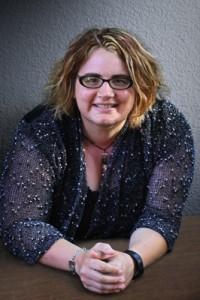

You talk in the book about how when she died in 2011, you kind of looked around and said, “Hmm, who’s going to pick up this mantle?” I think she used her anger a lot to get her through that, and to get her through that depression that living in this kind of oppression can give to people.

I mean, this entire system is in place, made to get you to give up and to accept the status quo. I just really loved her attitude toward change, which sounds terrible, but I think sometimes you need to have anger to drive you, because honestly, you get worn down very easily with all of the different things that come at you. Kill them all.” And I admired that, you know? I thought that was cool. Le Guin is like, “Hey, let’s all get along, and we’ll change things from the inside.” And Russ was like, “This whole system is screwed. What she’s doing there is so incredibly radical. The second time I tried to read it, I finally got it. It took me a long time to read The Female Man because it’s so dense and out there. Joanna Russ was like screw everything, burn it all down, rage against the machine. She is absolutely wonderful, but she was not as radical as Russ.

What was it about her writing that made such an impression on you? But that was my introduction, just me trying to get a better depth and breadth in the field of science fiction. She was kind of taken out of the game early due to health issues. I own everything that she’s ever written, which was not a lot, unfortunately. I’m trying to remember the first one I read. I stumbled across Le Guin, Joanna Russ, Vonda McIntyre, all of those New Wave feminist science fiction writers.

All the guys would tell you, “You kids these days, you don’t read the good stuff.” So, I started reading lots of Alfred Bester, and Heinlein, and all those folks. I went to the Clarion West writing workshop in the year 2000, so a while ago now, but that was when I started exploring some old-school science fiction because I was getting a lot of pushback. Visit to listen to the interview or other episodes.įirst of all, just tell us about how you discovered Joanna Russ. This interview first appeared in June 2016 on ’s The Geek’s Guide to the Galaxy podcast, which is hosted by David Barr Kirtley and produced by John Joseph Adams. That essay and many others are included in Kameron’s new book The Geek Feminist Revolution. Kameron Hurley is the author of such novels as God’s War and The Mirror Empire, and her essay on the history of women in conflict “We Have Always Fought” was the first blog post to be nominated for and win a Hugo award.


 0 kommentar(er)
0 kommentar(er)
